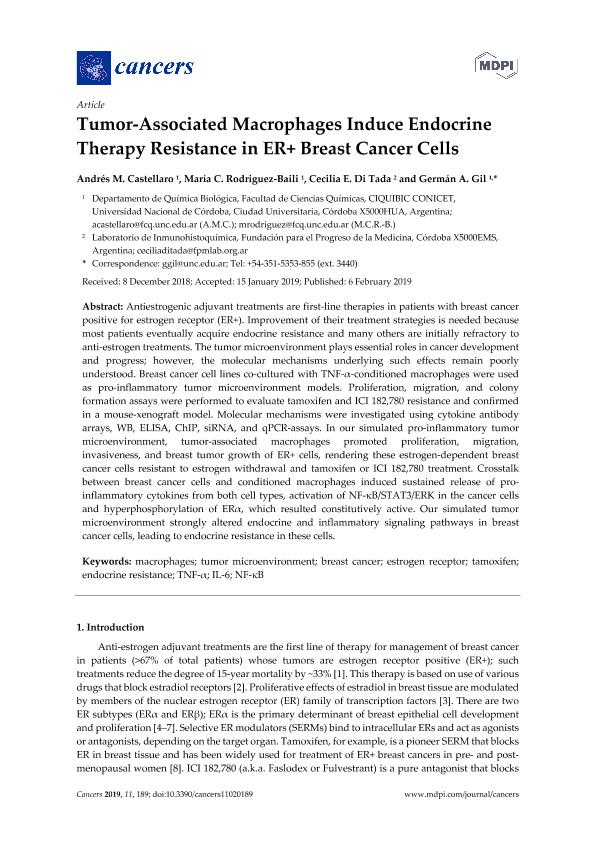Mostrar el registro sencillo del ítem
dc.contributor.author
Castellaro, Andrés Marcos

dc.contributor.author
Rodriguez, María Celeste

dc.contributor.author
Di Tada, Cecilia E.
dc.contributor.author
Gil, German Alejandro

dc.date.available
2021-03-29T18:27:11Z
dc.date.issued
2019-02
dc.identifier.citation
Castellaro, Andrés Marcos; Rodriguez, María Celeste; Di Tada, Cecilia E.; Gil, German Alejandro; Tumor-associated macrophages induce endocrine therapy resistance in ER+ breast cancer cells; MDPI AG; Cancers; 11; 2; 2-2019; 1-29
dc.identifier.issn
2072-6694
dc.identifier.uri
http://hdl.handle.net/11336/129163
dc.description.abstract
Antiestrogenic adjuvant treatments are first-line therapies in patients with breast cancer positive for estrogen receptor (ER+). Improvement of their treatment strategies is needed because most patients eventually acquire endocrine resistance and many others are initially refractory to anti-estrogen treatments. The tumor microenvironment plays essential roles in cancer development and progress; however, the molecular mechanisms underlying such effects remain poorly understood. Breast cancer cell lines co-cultured with TNF-α-conditioned macrophages were used as pro-inflammatory tumor microenvironment models. Proliferation, migration, and colony formation assays were performed to evaluate tamoxifen and ICI 182,780 resistance and confirmed in a mouse-xenograft model. Molecular mechanisms were investigated using cytokine antibody arrays, WB, ELISA, ChIP, siRNA, and qPCR-assays. In our simulated pro-inflammatory tumor microenvironment, tumor-associated macrophages promoted proliferation, migration, invasiveness, and breast tumor growth of ER+ cells, rendering these estrogen-dependent breast cancer cells resistant to estrogen withdrawal and tamoxifen or ICI 182,780 treatment. Crosstalk between breast cancer cells and conditioned macrophages induced sustained release of pro-inflammatory cytokines from both cell types, activation of NF-κB/STAT3/ERK in the cancer cells and hyperphosphorylation of ERα, which resulted constitutively active. Our simulated tumor microenvironment strongly altered endocrine and inflammatory signaling pathways in breast cancer cells, leading to endocrine resistance in these cells.
dc.format
application/pdf
dc.language.iso
eng
dc.publisher
MDPI AG
dc.rights
info:eu-repo/semantics/openAccess
dc.rights.uri
https://creativecommons.org/licenses/by-nc-sa/2.5/ar/
dc.subject
BREAST CANCER
dc.subject
ENDOCRINE RESISTANCE
dc.subject
ESTROGEN RECEPTOR
dc.subject
IL-6
dc.subject
MACROPHAGES
dc.subject
NF-ΚB
dc.subject
TAMOXIFEN
dc.subject
TNF-Α
dc.subject
TUMOR MICROENVIRONMENT
dc.subject.classification
Otras Ciencias Químicas

dc.subject.classification
Ciencias Químicas

dc.subject.classification
CIENCIAS NATURALES Y EXACTAS

dc.title
Tumor-associated macrophages induce endocrine therapy resistance in ER+ breast cancer cells
dc.type
info:eu-repo/semantics/article
dc.type
info:ar-repo/semantics/artículo
dc.type
info:eu-repo/semantics/publishedVersion
dc.date.updated
2020-11-20T19:59:39Z
dc.journal.volume
11
dc.journal.number
2
dc.journal.pagination
1-29
dc.journal.pais
Suiza

dc.description.fil
Fil: Castellaro, Andrés Marcos. Consejo Nacional de Investigaciones Científicas y Técnicas. Centro Científico Tecnológico Conicet - Córdoba. Centro de Investigaciones en Química Biológica de Córdoba. Universidad Nacional de Córdoba. Facultad de Ciencias Químicas. Centro de Investigaciones en Química Biológica de Córdoba; Argentina
dc.description.fil
Fil: Rodriguez, María Celeste. Consejo Nacional de Investigaciones Científicas y Técnicas. Centro Científico Tecnológico Conicet - Córdoba. Centro de Investigaciones en Química Biológica de Córdoba. Universidad Nacional de Córdoba. Facultad de Ciencias Químicas. Centro de Investigaciones en Química Biológica de Córdoba; Argentina
dc.description.fil
Fil: Di Tada, Cecilia E.. Fundación Para El Progreso de la Medicina; Argentina
dc.description.fil
Fil: Gil, German Alejandro. Consejo Nacional de Investigaciones Científicas y Técnicas. Centro Científico Tecnológico Conicet - Córdoba. Centro de Investigaciones en Química Biológica de Córdoba. Universidad Nacional de Córdoba. Facultad de Ciencias Químicas. Centro de Investigaciones en Química Biológica de Córdoba; Argentina
dc.journal.title
Cancers
dc.relation.alternativeid
info:eu-repo/semantics/altIdentifier/doi/http://dx.doi.org/10.3390/cancers11020189
dc.relation.alternativeid
info:eu-repo/semantics/altIdentifier/url/https://www.mdpi.com/2072-6694/11/2/189
Archivos asociados
